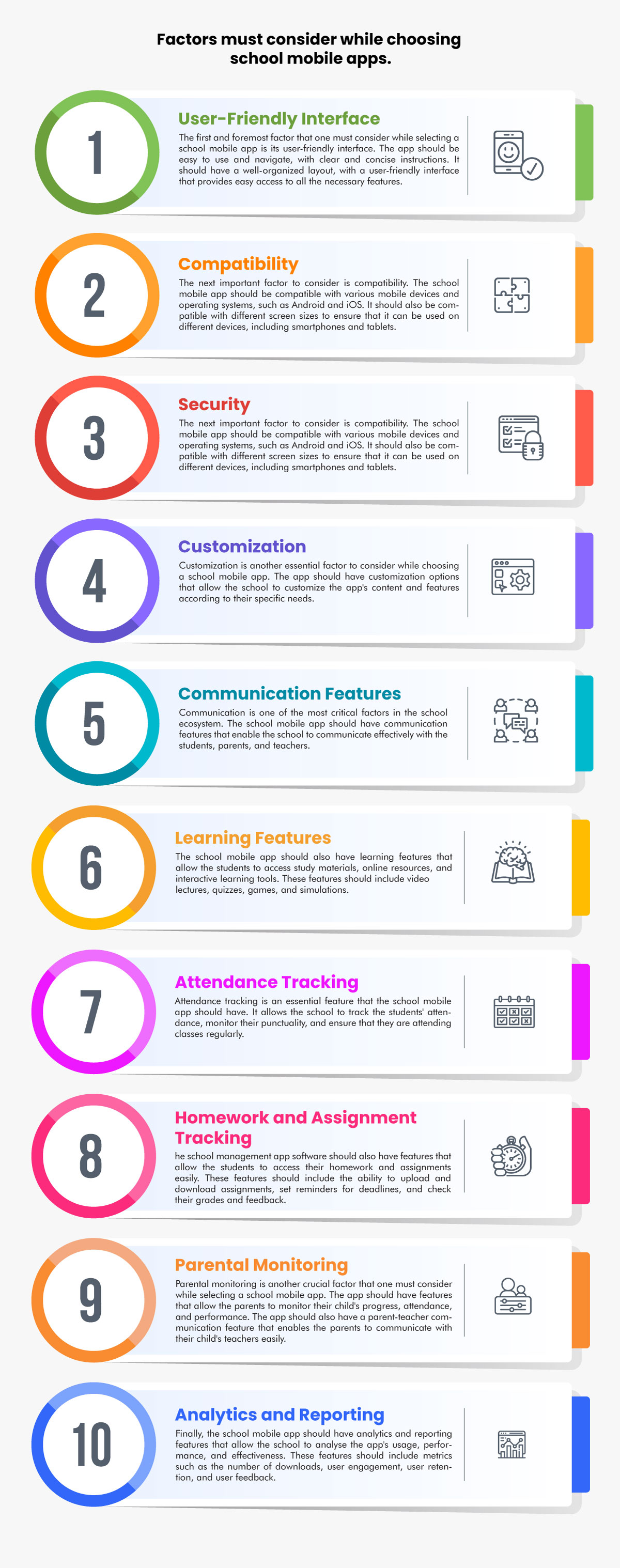
- Student Zone
-
Student Growth serves as a space for students, K-12 educators, parents and school professionals.
In recent years, mobile apps have become an essential part of our lives. They have transformed the way we communicate, work, and learn. The education sector is also not untouched by this digital transformation, and mobile apps have become an integral part of the school ecosystem. School mobile apps have numerous benefits, such as efficient communication, easy access to study materials, online learning, and much more. However, choosing the right school mobile app can be a daunting task. In this article, we will discuss some of the essential factors that one must consider while choosing school mobile apps.
User-Friendly Interface:
The first and foremost factor that one must consider while selecting a school mobile app is its user-friendly interface. The app should be easy to use and navigate, with clear and concise instructions. It should have a well-organized layout, with a user-friendly interface that provides easy access to all the necessary features. The interface should also be visually appealing to keep the students engaged and interested.
Compatibility:
The next important factor to consider is compatibility. The school mobile app should be compatible with various mobile devices and operating systems, such as Android and iOS. It should also be compatible with different screen sizes to ensure that it can be used on different devices, including smartphones and tablets.

Security:
Security is a critical factor to consider while selecting a school mobile app. The app should be designed with high-security measures to protect the students' personal information and prevent unauthorized access to the app's content. The app should also have a secure login process, with proper authentication and authorization methods, such as biometric authentication, two-factor authentication, and encryption.
Customization:
Customization is another essential factor to consider while choosing a school mobile app. The app should have customization options that allow the school to customize the app's content and features according to their specific needs. For example, the school should be able to add their logo, change the color scheme, and add or remove features based on their requirements.
Communication Features:
Communication is one of the most critical factors in the school ecosystem. The school mobile app should have communication features that enable the school to communicate effectively with the students, parents, and teachers. These features should include messaging, voice calls, video calls, and email. The app should also have push notifications that alert the users about any updates, announcements, or important events.
Learning Features:
The school mobile app should also have learning features that allow the students to access study materials, online resources, and interactive learning tools. These features should include video lectures, quizzes, games, and simulations. The app should also have a progress tracker that helps the students keep track of their learning progress and achievements.
Attendance Tracking:
Attendance tracking is an essential feature that the school mobile app should have. It allows the school to track the students' attendance, monitor their punctuality, and ensure that they are attending classes regularly. The app should have a user-friendly interface that allows the students to mark their attendance easily.
Homework and Assignment Tracking:
The school management app software should also have features that allow the students to access their homework and assignments easily. These features should include the ability to upload and download assignments, set reminders for deadlines, and check their grades and feedback.
Parental Monitoring:
Parental monitoring is another crucial factor that one must consider while selecting a school mobile app. The app should have features that allow the parents to monitor their child's progress, attendance, and performance. The app should also have a parent-teacher communication feature that enables the parents to communicate with their child's teachers easily.
Analytics and Reporting:
Finally, the school mobile app should have analytics and reporting features that allow the school to analyse the app's usage, performance, and effectiveness. These features should include metrics such as the number of downloads, user engagement, user retention, and user feedback. The app should also generate reports that provide insights into the students' learning progress, attendance, and performance. These reports can help the school identify areas of improvement and make data-driven decisions to enhance the students' learning experience.
In conclusion, choosing the right school mobile app is a critical decision that can have a significant impact on the students' learning experience. A good school mobile app should have a user-friendly interface, compatibility with different devices and operating systems, high-security measures, customization options, effective communication features, interactive learning tools, attendance and homework tracking, parental monitoring, and analytics and reporting features. By considering these essential factors, the school can select a mobile app that best meets their specific needs and provides an excellent learning experience for their students.